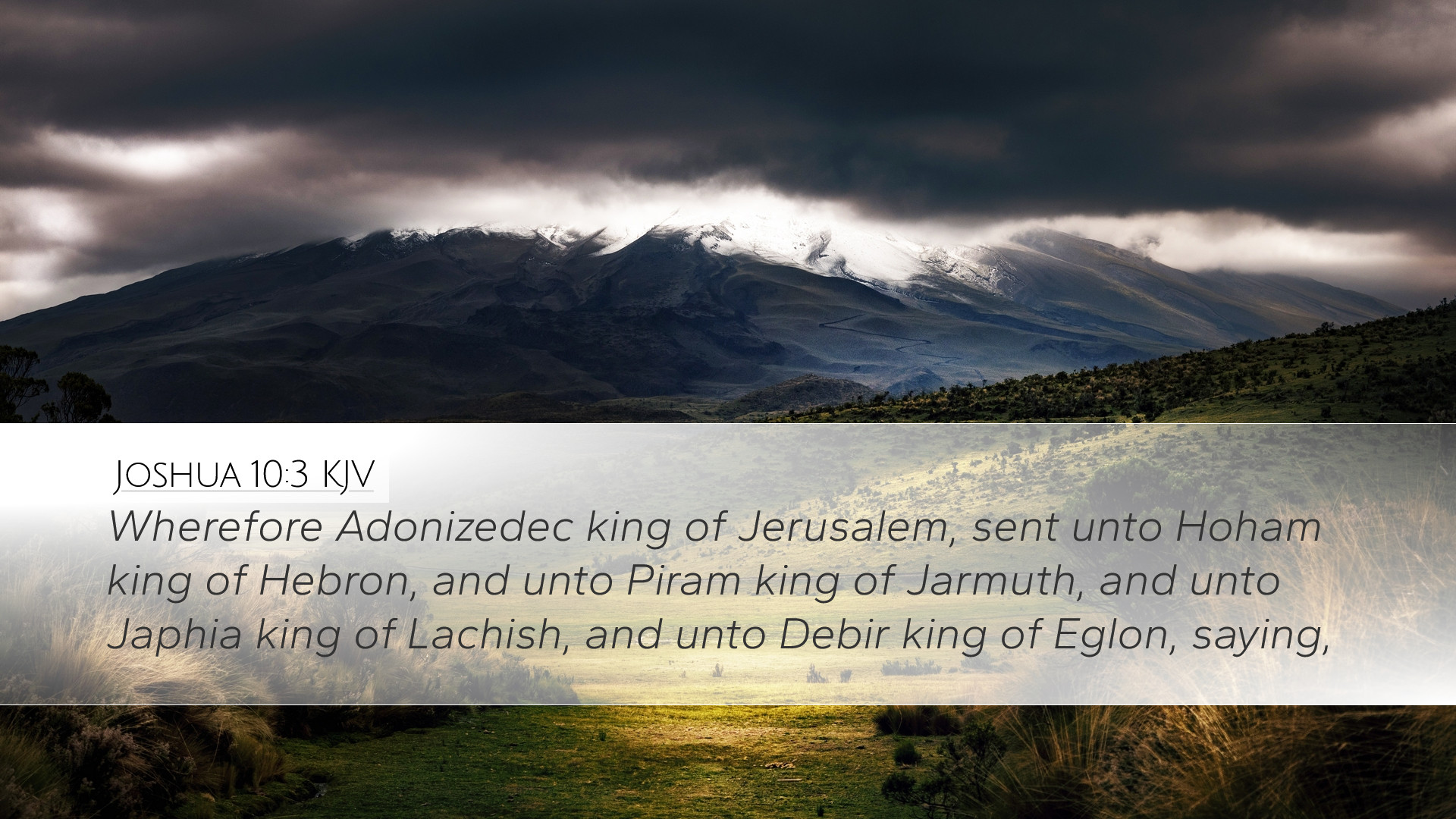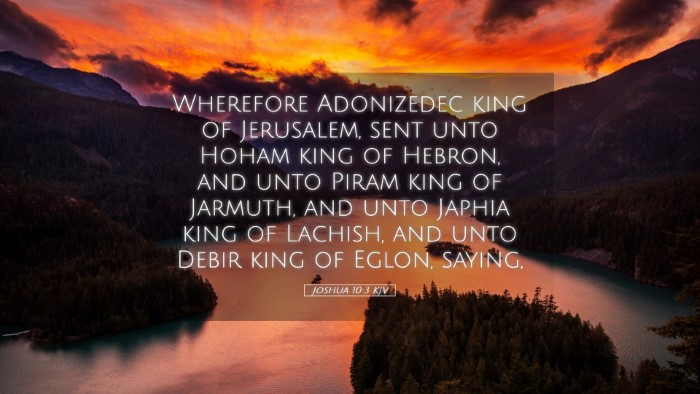Commentary on Joshua 10:3
Joshua 10:3 states, "Therefore Adonizedek king of Jerusalem sent to Hoam king of Hebron, and to Piram king of Jarmuth, and to Japhia king of Lachish, and to Debir king of Eglon, saying,"
Contextual Background
The events surrounding Joshua 10 occur after the Israelites have crossed the Jordan River and begun their conquest of the Promised Land. The city of Gibeon, recognizing the threat posed by the Israelites, has made a peace treaty with Joshua and the Israelites, which ultimately causes alarm among the other kings of Canaan. The significance of this act is profound, as it triggers alliances against Israel and sets the stage for divine intervention.
Insights from Matthew Henry
Matthew Henry notes that Adonizedek, the king of Jerusalem, felt threatened by the Gibeonites' alliance with Israel. In his view, the Gibeonites were seen as traitors to their Canaanite brethren, and their peace treaty with Israel galvanized Adonizedek.
Henry reflects on the nature of human rebellion against God. He emphasizes that those who oppose God's purposes will band together in hopes of resisting His will. Adonizedek's response illustrates the inevitable conflict that arises when God's people are in the midst of their mission.
Insights from Albert Barnes
Albert Barnes elaborates on the geopolitical ramifications of the Gibeonites' strategic alliance with Israel. He points out Adonizedek's fear in sending messages to the other kings of Canaan—this shows the psychological impact the Israelites were having by their conquests. Barnes suggests that this alliance was essential for the overall success of Israel's campaign.
He also comments on the nature of Adonizedek’s coalition, highlighting the various cities involved like Hebron, Lachish, and Eglon. Each of these cities had its own significance and strengths which, when united against Israel, represented a formidable threat. Barnes notes the importance of unity among adversaries when faced with a common enemy.
Insights from Adam Clarke
Adam Clarke provides a detailed analysis of the motives behind Adonizedek's actions. He emphasizes that the fear of the Israelites was rooted in their past victories and the miraculous powers attributed to God. Clarke states that this coalition among the kings demonstrates the underlying tension in Canaan—the moral and spiritual danger of opposing God's chosen people.
Clarke also mentions the identities and roles of each city leader involved in the coalition. By analyzing their historical contexts, he suggests that they were motivated by self-preservation and a desire to maintain their power against the advancing Israelites.
Theological Significance
The confrontation initiated by Adonizedek illustrates broader theological themes found throughout Scripture. The response of the Israelites to external threats showcases God’s sovereignty and faithfulness to protect His people. The rebellion by the Canaanite kings serves as a reminder of the opposition that believers often face in their walk with God.
This verse also invites readers to consider the dynamics of spiritual warfare and the alliances formed against the truth and the people of God. Such patterns persist throughout history and remind the faithful that even in overwhelming circumstances, God stands as the ultimate protector and judge.
Application for Pastors and Theologians
The narrative surrounding Joshua 10:3 provides various applications for contemporary ministry and scholarship:
- Understanding Opposition: It communicates the reality of spiritual warfare and the necessity for unity among believers to face challenges together.
- Encouragement in Fear: It reassures those in ministry that opposition can often spur collective efforts to resist God's work, but God remains in control.
- Significance of Alliances: Churches may need to consider whom they align with and the implications of those partnerships.
- Lessons of Leadership: Leaders must evaluate their response to threats and challenges, drawing insight from Joshua’s faithfulness amidst adversities.
Conclusion
In conclusion, Joshua 10:3 not only recounts a historical event but serves as a profound reminder of the interplay between divine providence and human opposition. By examining the perspectives of notable commentators like Matthew Henry, Albert Barnes, and Adam Clarke, one can appreciate the depth of the text and its implications for both ancient and contemporary faith communities. The experiences of the Israelites affirm that God’s purpose will prevail despite any adversarial coalitions formed against His work.


